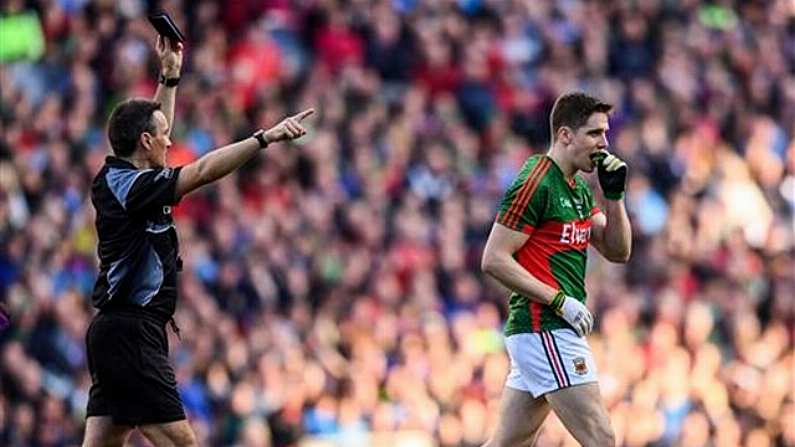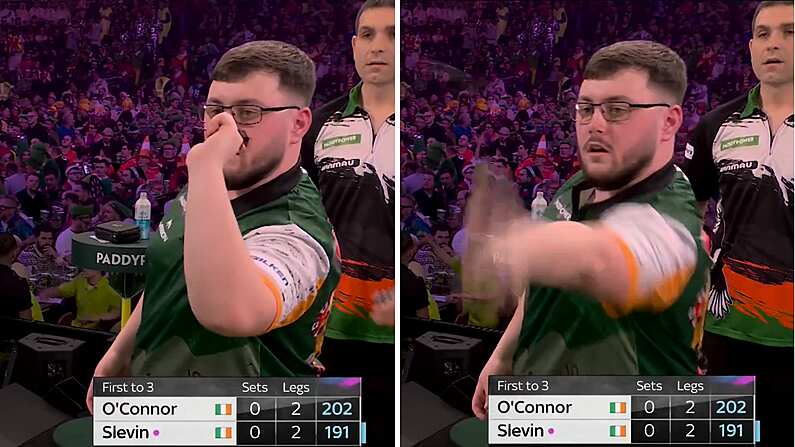The black card is running out of friends at an alarming rate. In terms of popularity, it's down there with the invasion of Iraq at this point. And it probably has fewer defenders going out to bat for it.
Even Eugene McGee, the man who wept with joy when he forced its introduction through Congress, says a review is in order. Though, his objection centres more on the fact that referees are failing to enforce it properly.
"It's in the DNA of GAA people around the country of 'Ah Jaysus, don't send off that fella'", he told Declan Bogue in the Belfast Telegraph.
Sean Cavanagh has spent the latter part of the season tweeting his profuse apologies for his role in ushering in the black card. However, as has already been pointed out, he has his chronology of events mixed up.
Like Home Rule back in 1914, the black card was already on the statute books when Sean hauled down Conor McManus in the 2013 All-Ireland quarter-final. However, the foul was widely cited as a vindication of the incoming law. An indispensable aspect of the video montages used to promote it.
A straightforward return to the days of the pre-black card situation isn't exactly desirable either. Remember the closing stages of the 2013 All-Ireland final...
Also, Peter Canavan, who described the law as 'scutter' on the Last Word the other day (borrowing the word from a critical texter) did note that it has at least stamped out body-checking and third man tackles.
On Off the Ball last night, Mike Quirke offered an intriguing solution, one that has to be looked at seriously.
He leaned the Sean Cavanagh example when illustrating his amendment to the law. And he borrows the Aussie Rules rule on advancing the free up 50 metres.
The fairest way to do this black card thing is to apply it for that typical Sean Cavanagh foul - where a guy is bearing down on goals and it's a stonewall, clear case of "I'm taking you down to prevent a goalscoring opportunity."
I think any of the rest of these cynical fouls, anywhere from high up the pitch to the middle of the field, you hit them with the Aussie Rules 50 metre penalty.
So, now what you're actually doing if you have a cynical foul out around the middle of the field, you advance the ball 50 yards. And most times, when you advance the ball 50 metres, that's going to lead to a score or a scoring opportunity for the opposition.
And all these ones late in the game when you see guys pull somebody down around the half-back line, a black card is just doing nothing to alleviate that situation. It's no real punishment to be able to take off a guy and replace another guy.
Bring the ball up 50 metres, kick it over the bar and now we've got a punishment on the scoreboard that actually makes guys stop doing this kind of thing.
And leave the black card for something that is completely and most definitely a deliberate pull-down when a guy is bearing down on goal.
This proposal seems to work on a couple of levels. It doesn't result in players being sent off early in the game for relatively innocuous incidents, a la Jonny Cooper.
Better still, it would serve as a better deterrent to cynical fouling in the final minutes of tight games. This, after all, is where the real problem lies.
Namely, when a team is trying to mount a late attack and they face a wall of opponents intent on rugby tackling them. Kevin Mc ensuring Lee Keegan wasn't getting forward late in the 2013 final.
Obviously, we still have a host of complaints about a referee's interpretation and application of the rule. People will continue to moan about "inconsistency."
But that'll happen regardless of what rule is put in place. The Quirke solution is worth a shot.
[soundcloud url="https://api.soundcloud.com/tracks/285895132" params="auto_play=false&hide_related=false&show_comments=true&show_user=true&show_reposts=false&visual=true" width="100%" height="450" iframe="true" /]










